|
|
|
Sort Order |
|
|
|
Items / Page
|
|
|
|
|
|
|
| Srl | Item |
| 1 |
ID:
163069
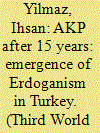

|
|
|
|
|
| Summary/Abstract |
In recent years, several observers of Turkey have recognised a novel development in Turkish politics: the rise of Erdoganism. President Recep Tayyip Erdoğan’s personality and style have come to embody the Turkish nation, the state and its economic, social and political institutions. But what is Erdoganism? What are its main attributes? Is it a mere ideology or the name of the emerging political regime in Turkey? While commentators have provided several observations of Erdoganism, it has not been duly examined on its own in the academic literature. This paper’s main premise is that in Turkey, a new political regime has emerged in recent years which can best be defined as Erdoganism. Erdoganism has four main dimensions: electoral authoritarianism as the electoral system, neopatrimonialism as the economic system, populism as the political strategy and Islamism as the political ideology. We first explain why we think Erdoganism is a better concept to define the emerging political regime in Turkey. We briefly discuss Sultanism, Khomeinism and Kemalism in order to produce a set of references for our discussion of Erdoganism. We then provide a thorough analysis, explaining the ways in which Erdoganism manifests itself through electoral authoritarianism, neopatrimonialism, populism and Islamism.
|
|
|
|
|
|
|
|
|
|
|
|
|
|
|
|
| 2 |
ID:
082132
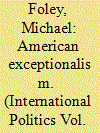

|
|
|
|
|
| Publication |
2007.
|
| Summary/Abstract |
Because American populism has traditionally been associated with indigenous themes and inward perspectives, it has never been thought to be particularly relevant to the United States' outlook upon the international order or its understanding of the generic requirements of foreign policy-making. However, recent developments surrounding the formulation and prosecution of the war on terror have cast doubts on this negative correlation. Using four thematic and analytical categories, the article reveals President Bush's close dependency upon characteristically populist principles in the way that the issue was presented to, and mediated with, the American public. It surveys the way that the Bush team employed populist narratives in advocating the need for alternative channels of international action outside both the customary agencies of collective security and the established conventions of international law. Although the usage of populist techniques was initially effective, the administration subsequently experienced some of the defects that have traditionally afflicted populism as an agency of political transformation
|
|
|
|
|
|
|
|
|
|
|
|
|
|
|
|
| 3 |
ID:
185630
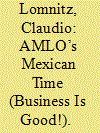

|
|
|
|
|
| Summary/Abstract |
President Andrés Manuel López Obrador has promoted himself as a historical figure equal to the great heroes of Mexico’s national mythology. His populist rhetoric denigrates political opponents as enemies of the people. But more than two years into his term, his promises of economic growth have failed to materialize, partly because of his attachment to austerity.
|
|
|
|
|
|
|
|
|
|
|
|
|
|
|
|
| 4 |
ID:
168785
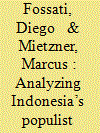

|
|
|
|
|
| Summary/Abstract |
Using original survey data, we test the level, distribution, and demographic patterns of populist attitudes in Indonesia. Populist attitudes are widely spread across the political spectrum; disproportionately high in the middle and upper classes; and particularly robust when coupled with other primary ideologies, such as Islamism and secularism.
|
|
|
|
|
|
|
|
|
|
|
|
|
|
|
|
| 5 |
ID:
165204
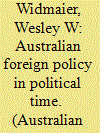

|
|
|
|
|
| Summary/Abstract |
Over the past century, Australian foreign policy orders have been stabilised by the construction of ideas that have reduced uncertainty regarding national interests. Yet, such ideas have often evolved in ways that have engendered misplaced certainty, renewed instability, and crisis. To explain such shifts, I highlight the role of an Australian ‘pragmatic liberal tradition’, one which has enabled alternating tendencies to principled stability or technocratic hubris. In a tripartite model, I trace stages over initial ‘middle power’ efforts to construct ideas that lead states—and particularly great powers—to identify interests in cooperation, misplaced certainty in great power ties which obscures new challenges, and the construction of crises that impede or enable change. Empirically, I apply this framework to the construction, conversion, and crises of the ongoing ‘Reform order’. These span the initial Hawke-era middle power integration of US and regional ties, Howard-era misplaced certainty in US-styled neoconservative bandwagoning and neoliberal macroeconomic accommodation, and evolving constructions of the War on Terror and Global Financial Crisis. In the conclusion, I address theoretical and policy implications, highlighting the initial challenges that crises can pose for middle power leadership, and the subsequent scope for creativity.
|
|
|
|
|
|
|
|
|
|
|
|
|
|
|
|
| 6 |
ID:
185908
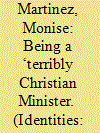

|
|
|
|
|
| Summary/Abstract |
Aiming to contribute to the debates on the entanglements among the far-right and anti-feminism Latin America, this article seeks to shed light on the performance of Damares Alves as Brazil’s Minister of Women, Family and Human Rights. Regarding Alves’s conservatism along her political career, particularly during the 2018 presidential run, this study provided an analysis on the reasons behind her prominence to the ongoing bolsonarism, and on how she contributed to building the gender knowledge that anchors the populist narrative in Bolsonaro’s political project. Concerning anti-feminist project’s foundations, as well as Alves’s performance as a Christian-conservative woman, a set of her speeches in the first 19 months of her term was scrutinised, by adopting the FCDA as methodology and using the thematic analysis as a method. The pointing of Alves’s discursive strategies revealed her attacks on feminisms, and the aim of legitimising herself and Bolsonaro’s political project as pro-women.
|
|
|
|
|
|
|
|
|
|
|
|
|
|
|
|
| 7 |
ID:
187045
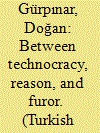

|
|
|
|
|
| Summary/Abstract |
This article aims to demonstrate the tension inherent within the Turkish opposition between those favoring technocratic anti-populism and/or pragmatic politics and those calling for a passionate and resolute anti-AKP platform seeking revenge. These competing inclinations offer alternate anti-populist platforms and ‘styles.’ The article asks whehter opposition to a populist regime inherently generates an anti-populist platform that ideologically confronts it. The article examines three contenders to President Erdoğan as representatives of three alternative anti-populist styles. It also reflects on the debates among various public intellectuals around the ways to electorally defeat populism.
|
|
|
|
|
|
|
|
|
|
|
|
|
|
|
|
| 8 |
ID:
144831
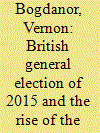

|
|
|
|
|
| Summary/Abstract |
Many on the left hoped that the 2015 general election in Britain would prove a social democratic moment. Instead, it proved a nationalist moment, since the only parties radically to increase their vote were UKIP and the SNP. This mirrored trends on the Continent, where nationalist parties on the right and the left have been the beneficiaries of the financial collapse of 2008. These parties exploit a new social cleavage between those who benefit from globalisation and those left behind. The new parties exploit issues of identity rather than economics, and these issues—whether Britain remains in the European Union, whether mass immigration continues and whether Scotland remains in the United Kingdom—are likely to dominate the 2015 parliament.
|
|
|
|
|
|
|
|
|
|
|
|
|
|
|
|
| 9 |
ID:
178565
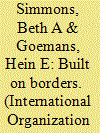

|
|
|
|
|
| Summary/Abstract |
The Liberal International Order is in crisis. While the symptoms are clear to many, the deep roots of this crisis remain obscured. We propose that the Liberal International Order is in tension with the older Sovereign Territorial Order, which is founded on territoriality and borders to create group identities, the territorial state, and the modern international system. The Liberal International Order, in contrast, privileges universality at the expense of groups and group rights. A recognition of this fundamental tension makes it possible to see that some crises that were thought to be unconnected have a common cause: the neglect of the coordinating power of borders. We sketch out new research agendas to show how this tension manifests itself in a broad range of phenomena of interest.
|
|
|
|
|
|
|
|
|
|
|
|
|
|
|
|
| 10 |
ID:
110964
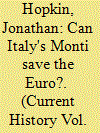

|
|
|
|
|
| Publication |
2012.
|
| Summary/Abstract |
Italy may reluctantly accept being 'saved by Europe' once again. But…[if] the country turns back to populism, there will be dramatic consequences for the governance of the European economy.
|
|
|
|
|
|
|
|
|
|
|
|
|
|
|
|
| 11 |
ID:
178549
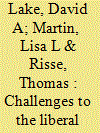

|
|
|
|
|
| Summary/Abstract |
As International Organization commemorates its seventy-fifth anniversary, the Liberal International Order (LIO) that authors in this journal have long analyzed is under challenge, perhaps as never before. The articles in this issue explore the nature of these challenges by examining how the Westphalian order and the LIO have co-constituted one another over time; how both political and economic dynamics internal to the LIO threaten its core aspects; and how external threats combine with these internal dynamics to render the LIO more fragile than ever before. This introduction begins by defining and clarifying what is “liberal,” “international,” and “orderly” about the LIO. It then discusses some central challenges to the LIO, illustrated by the contributors to this issue as well as other sources. Finally, we reflect on the analytical lessons we have learned—or should learn—as the study of the LIO, represented by scholarship in International Organization, has sometimes overlooked or marginalized dynamics that now appear central to the functioning, and dysfunction, of the order itself.
|
|
|
|
|
|
|
|
|
|
|
|
|
|
|
|
| 12 |
ID:
131242
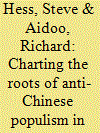

|
|
|
|
|
| Publication |
2014.
|
| Summary/Abstract |
In this article the authors conduct focused case studies on Zambia and Ghana to investigate the increasingly diverse popular reactions to Chinese engagement throughout the region of sub-Saharan Africa. In this effort they challenge the existing binary exploitation/opportunity paradigm through which growing Chinese engagement in sub-Saharan Africa is often analyzed. Instead, they propose an alternative framework, which centers less on the positive or nefarious nature of Chinese involvement and more on the institutional structures of African regimes. As opposed to closed autocracies and consolidated multiparty democracies, fluid transitional states create opportunities for the appearance of anti-Chinese populist movements akin to Michael Sata and the Patriotic Front in Zambia.
|
|
|
|
|
|
|
|
|
|
|
|
|
|
|
|
| 13 |
ID:
118023
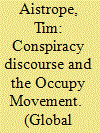

|
|
|
|
|
| Publication |
2013.
|
| Summary/Abstract |
Conspiracy theory has come up frequently in general media commentary around the Occupy Wall Street movement. For all their good intentions, Occupy is hampered by a paranoid style of populism that sees nefarious elites behind everything - or so the story goes.1 This paper takes the conspiracy discourse around Occupy as an entry point into the underlying dynamics of power and interpretation that help set the conditions of possibility for dissent in the liberal context.
|
|
|
|
|
|
|
|
|
|
|
|
|
|
|
|
| 14 |
ID:
167232
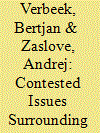

|
|
|
|
|
| Summary/Abstract |
Populism seems to be a well-established notion in public and academic debate alike. Nevertheless, several issues surrounding populism are still contested and thus merit closer attention. These contested issues encompass the extent to which populism is novel and ubiquitous; the scope of the phenomenon; the merits of the various definitions of populism; its political colour(s); the potential danger it poses to democracy; its appropriateness to govern; as well as populism’s impact beyond national borders.
|
|
|
|
|
|
|
|
|
|
|
|
|
|
|
|
| 15 |
ID:
183711
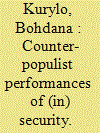

|
|
|
|
|
| Summary/Abstract |
IR scholarship has recently seen a burgeoning interest in the right-wing populist politics of security, showing that it tends to align with the international ultraconservative mobilisation against ‘gender ideology’. In contrast, this article investigates how local feminist actors can resist right-wing populist constructions of (in)security by introducing counter-populist discourses and aesthetics of security. I analyse the case of Poland, which presents two competing populist performances of (in)security: the Independence March organised by right-wing groups on Poland's Independence Day and the Women's Strike protests against the near-total ban on abortion. The article draws on Judith Butler's theory of the performative politics of public assembly, which elucidates how the political subject of ‘the people’ can emerge as bodies come together to make security demands through both verbal and non-verbal acts. I argue that the feminist movement used the vehicle of populist performance to subvert the exclusionary constructions of (in)security by right-wing populists. In the process, it introduced a different conception of security in the struggle for a ‘livable life’. The study expands the understanding of the relationship between populism, security and feminism in IR by exploring how the populist politics of security is differently enacted by everyday agents in local contexts.
|
|
|
|
|
|
|
|
|
|
|
|
|
|
|
|
| 16 |
ID:
189991
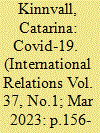

|
|
|
|
|
| Summary/Abstract |
This short article discusses how different fantasy narratives have come together during the Covid-19 crisis in various far-right movements, parties and audiences across the world and how much of these fantasies rely on racialised and gendered notions of a fantastical world-order in which particular forms of emotional governance provide a relief and sense of security to certain societal groups. This involves a close engagement with crisis and crisis narratives in relation to ontological insecurity and anxiety; how such crisis narratives have materialised in fantasies related to borders and corona nationalism, and the emotional governance of these particular fantasies in the hands of populist leaders and their increasingly receptive audiences.
|
|
|
|
|
|
|
|
|
|
|
|
|
|
|
|
| 17 |
ID:
155428
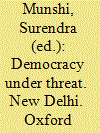

|
|
|
|
|
| Publication |
New Delhi, Oxford University Press, 2017.
|
| Description |
xxviii, 258p.hbk
|
| Standard Number |
9780199484805
|
|
|
|
|
|
|
|
|
|
|
|
Copies: C:1/I:0,R:0,Q:0
Circulation
| Accession# | Call# | Current Location | Status | Policy | Location |
| 059208 | 321.8/MUN 059208 | Main | On Shelf | General | |
|
|
|
|
| 18 |
ID:
186796
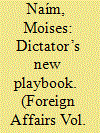

|
|
|
| 19 |
ID:
129963
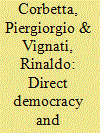

|
|
|
|
|
| Publication |
2014.
|
| Summary/Abstract |
Italy is one the most europhile countries in the European Union. Nevertheless, as surveys show, over the last few years anti-European sentiments have increasingly surfaced among Italian citizens. Furthermore, there is now an important novelty regarding the relation between Italy and Europe: the Movimento 5 Stelle (The Five Star Movement), a new party that expresses a peculiar and contradictory position towards Europe. Its leader, Beppe Grillo, sometimes advocates more, not less, unification, but he also proposes a referendum on Italian membership of the euro. Moreover, Grillo's blog frequently lends its voice to the choir of openly anti-European sentiment. Indeed, Grillo's call for direct democracy is plebiscitarian and his positions contribute to the weakening of a European project that is already facing grave difficulties of its own.
|
|
|
|
|
|
|
|
|
|
|
|
|
|
|
|
| 20 |
ID:
184050
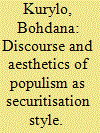

|
|
|
|
|
| Summary/Abstract |
Populists have lately been at the forefront of securitisation processes, yet little attention has been paid to the relationship between populism and securitisation. This paper investigates the role of securitisation in populism, exploring how the populist mode of securitising differs from traditional securitisation processes. It argues that securitisation is inherently embedded in populism which embodies a particular style of securitisation with a distinct set of discursive and aesthetic repertoires. The populist invocation of societal security and their claim to defend the fundamentally precarious identity of ‘the endangered people’ necessitate an unceasing construction of new threats. Aiming to discredit ‘elitist’ securitisation processes, populism invests in a specific construction of the referent object, the securitising actor and their relationship to the audience. The populist securitising style also carries a distinctive aesthetic centred on ‘poor taste’, sentimental ordinariness and unprofessionalism, examining which can widen our understanding of the aesthetics of security.
|
|
|
|
|
|
|
|
|
|
|
|
|
|
|
|
|
|
|
|
|